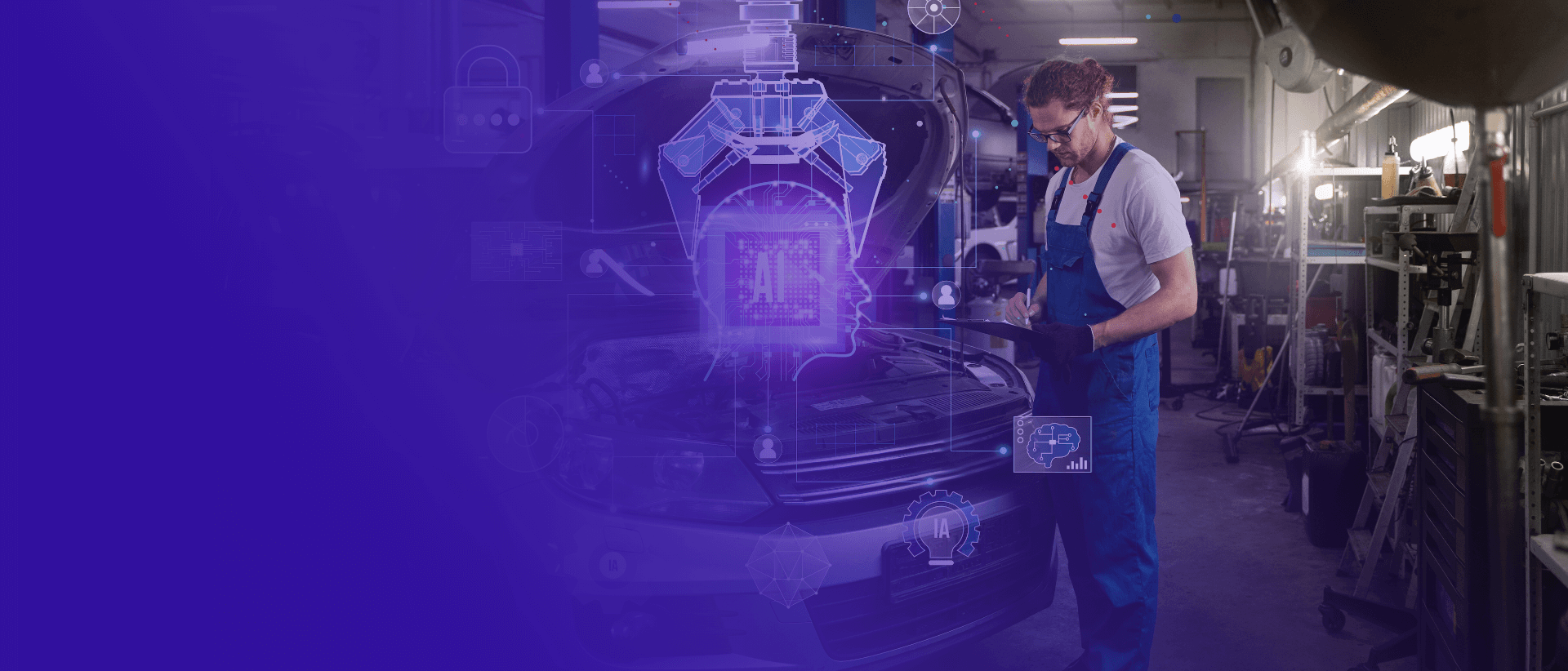
Automotive Industry
Driving The Future with Digital Innovation
Automotive industry is increasingly integrating advanced technologies like AI, IoT, Blockchain, and 5G network, paving way for innovative automotive solutions. From autonomous vehicles to connected car ecosystems, digital transformation for automotive industry aims to enhance efficiency, safety, and user experience.
At Futurism Technologies, we specialize in helping automotive manufacturers and suppliers harness the power of digital innovation. Our services are geared towards creating smart automotive products, optimizing supply chains, enhancing manufacturing processes, and elevating customer experiences.
The integration of Artificial Intelligence (AI) in the automotive sector has revolutionized the way vehicles are designed, manufactured, and used.
Consumer Trend Prediction: Forecast consumer choices, aiding tailored vehicle development.
Manufacturing Optimization: AI-driven robotics optimize production by predictive maintenance.
Advanced Vehicle Features: AI powered safety systems like ADAS and intuitive voice assistants.
Autonomous Driving: AI is the foundation for self-driving technology, improving by real-time learning.
Personalized Driving Experience: AI customizes in-car settings based on driver behavior.
Cybersecurity Measures: AI ensures data security for cyber threats in connected vehicles.
The integration of IoT (Internet of Things) in the automotive sector has revolutionized the way vehicles operate, enhancing various aspects of user experience and efficiency.
Enhanced Connectivity: IoT enables vehicle-infrastructure communication, improving traffic and safety.
Improved User Experience: Personalized features like advanced navigation & in-car entertainment.
Predictive Maintenance: IoT sensors predict maintenance needs.
Safety and Security: Remote monitoring and emergency services connectivity enhance vehicle security.
Data Analytics: Collected data offers insights into driving patterns, aiding product improvements and targeted marketing.
Fleet Management: IoT assists in tracking vehicles, optimizing routes, and monitoring driver behavior.
Regulatory Compliance: Continuous monitoring ensures compliance with standards, fostering industry-wide interoperability.
Blockchain technology has emerged as a disruptive force in the automotive industry, offering innovative solutions to various challenges. Leveraging its decentralized and secure nature, blockchain finds application in several areas within the automotive sector:
Secure Transactions: Blockchain ensures secure and transparent financial transactions.
Supply Chain Management: Enhances transparency and traceability in the automotive supply chain.
Authenticity Verification: Verifies the authenticity of automotive parts by storing unique identifiers on a blockchain.
Data Security and Privacy: Ensures data security and privacy through cryptographic features.
Vehicle History and Maintenance: Maintains immutable records of vehicle history and maintenance on a blockchain.
Decentralized Insurance: Enables usage-based insurance models by storing and analyzing vehicle data transparently.
Cloud computing has revolutionized numerous industries, including the automotive sector, by offering scalable, efficient, and collaborative solutions for data management and operations.
Data Management: Enables efficient storage, processing, and analysis of vehicle data.
Scalability and Flexibility: Allows for scalable infrastructure, handling large volumes of real-time data from connected vehicles.
Enhanced Collaboration: Facilitates real-time communication and joint development among stakeholders.
Cost Efficiency and Optimization: Reduces infrastructure costs, optimizes resource utilization, and streamlines supply chain management.
Cybersecurity and Data Privacy: Prioritizes robust cybersecurity measures to protect sensitive automotive data.
Augmented Reality (AR) has emerged as a revolutionary technology in the automotive sector, transforming vehicle repairs and maintenance processes. Integrating AR into the maintenance domain offers several benefits, streamlining tasks for mechanics and empowering vehicle owners with intuitive guidance.
Streamlined Repairs: AR provides guidance for mechanics, overlaying digital instructions onto real-world vehicles during maintenance.
Efficient Diagnostics: Mechanics use AR to diagnose issues by superimposing diagnostic data onto physical components.
Hands-Free Assistance: AR headsets or smart glasses offer hands-free access to repair manuals and schematics
Empowering Owners: Vehicle owners can access AR-guided tutorials on smartphones or AR glasses.
Future Potential: Integration of AR with IoT and data analytics.
In the rapidly evolving landscape of automotive technology, ensuring the security of connected vehicles has become paramount. Cybersecurity solutions are imperative to safeguard vehicles from potential cyber threats.
Risk Assessment: Identify vulnerabilities in vehicle systems by comprehensive risk assessments.
Encryption & Protection: Implement encryption to safeguard data transmitted within and outside the vehicle.
Real-Time Monitoring: Deploy systems for monitoring and intrusion detection to swiftly respond to threats.
Multi-Layered Defense: Utilize firewalls, secure gateways, and authentication to create a strong security framework.
Standards Adherence: Collaborate for industry-wide cybersecurity standards adherence and follow regulatory guidelines.
Patch Management: Regular updates and OTA capabilities for addressing new vulnerabilities.
User Education: Conduct training to enhance awareness about cybersecurity risks and safe practices.
Incident Response Plans: Develop protocols for rapid response and recovery in case of cyber-attacks.
Predictive maintenance and remote monitoring have become integral aspects of modern automotive technology, revolutionizing vehicle management and maintenance strategies. Leveraging cutting-edge predictive analytics, these technologies empower manufacturers, service providers, and vehicle owners to anticipate, identify, and prevent potential issues before they escalate, thereby minimizing downtime and costly repairs.
Predictive Analytics Implementation: Leveraging advanced algorithms and IoT sensors for real-time data analysis.
Proactive Maintenance Approach: Shifting from reactive to proactive strategies by addressing problems beforehand.
Cost and Time Efficiency: Reducing operational costs and downtime by avoiding unexpected repairs through remote monitoring and predictive insights.
Enhanced Vehicle Safety: Ensuring optimal vehicle performance, improving safety, and reliability by addressing issues early.
Fleet Management Optimization: Allowing remote monitoring of vehicle fleets, optimizing maintenance schedules, and enhancing operational efficiency.
Real-time Diagnostics and Alerts: Providing immediate alerts to drivers and service centers about detected issues, enabling prompt action.
Data Security Measures: Implementing robust security to protect sensitive vehicle data and ensuring compliance with privacy regulations.
The automotive industry is increasingly leveraging big data analytics to extract valuable insights from the vast amount of data generated by vehicles. This data-driven approach provides significant benefits for automakers, fleet operators, and city planners, revolutionizing the way they understand, manage, and optimize various aspects of transportation.
Predictive Maintenance: Real-time data analysis predicts potential vehicle issues.
Enhanced Safety: Utilizing vehicle data improves safety with advanced driver-assistance systems (ADAS) and hazard detection.
Fleet Optimization: Data-driven insights optimize routes, fuel efficiency, and maintenance for fleet operations.
Consumer Understanding: Analytics reveal customer preferences, aiding in tailored vehicle design and improved marketing.
Urban Planning: Vehicle data assists in traffic management, infrastructure planning, and environmental impact assessment for smarter cities.
Environmental Impact: Insights help develop eco-friendly vehicles and strategies to reduce emissions, promoting sustainability.
Monetization Opportunities: Data can be leveraged for innovative services like personalized insurance and new revenue streams.
Fleet management solutions play a pivotal role in optimizing the operational efficiency of businesses that rely on a fleet of vehicles. These services encompass a range of technological innovations and analytics aimed at enhancing the overall performance, safety, and cost-effectiveness of managing a fleet:
Vehicle Tracking: Real-time monitoring through GPS for precise location tracking and route optimization.
Driver Behavior Analysis: Monitoring driving habits to enhance safety and fuel efficiency.
Maintenance Optimization: Predictive analytics to schedule maintenance and prevent breakdowns.
Cost Management: Detailed reports for better expense control and compliance with regulations.

AI & ML Solutions
Automotive

MOBILITY
AUTOMOTIVE
Make your business more successful with latest tips and updates for technologies